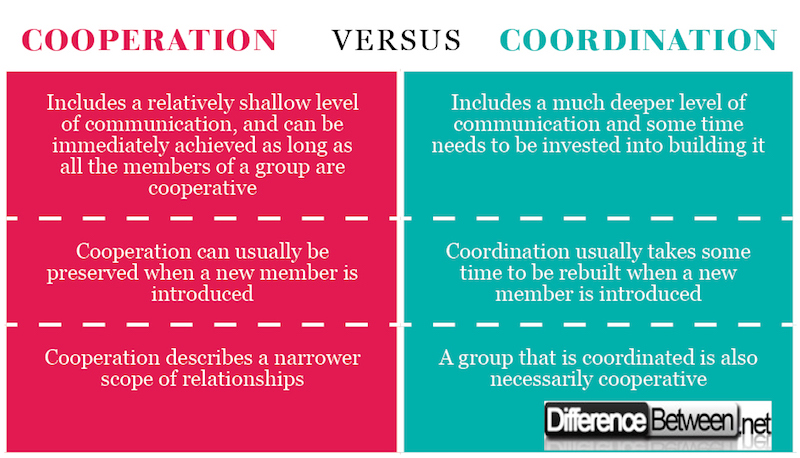Difference Between Coordination and Cooperation
While most people are pretty familiar with the meaning of coordination and cooperation in terms of biology and anatomy, there are still some misconceptions about their similarity and difference in terms of management that I’ll address here. I’ll also use some analogies with their biological meaning, to explain their meaning in management.
Cooperation includes several people that all have the same goals they want to achieve. In order to achieve them, they start working together and form a system that is supposed to bring them to the achievement they’re striving for faster than if they were to all work individually. However, the result of cooperation, the achieved common goal, is a result of each individual member of the system. In other words, even if there was no cooperation present, in most cases, the goal would have been achieved anyway, although at much greater cost of time, resources or people.
Coordination is different in that regard. A great example is human motoric coordination. You coordinate your hand movements to at the same time, say, open a jar. If you tried to open it with either hand individually, you would have failed. It is the combined effort that brought the idea to fruition. Therefore, coordination is fundamentally different from cooperation. Another way to look at this is the following – when a group of people becomes coordinated, that group can be regarded as another entity working on its own. However, when people are cooperative, that just means that they form an enterprise in which they will each individually work more efficiently and altogether achieve a goal faster than they would otherwise.
When looking at coordination and cooperation in terms of managing a company, the basic difference is in the fact that coordination is something intrinsic to the organization, while cooperation is voluntary and based on each member of the organization individually. Following a similar train of thought, coordination can be looked at as the wider term than cooperation, seeing as a coordinated system will also inherently be a system with cooperative members. Additionally, cooperation is required as a first step to achieving coordination.
What is Cooperation?
When talking about this term, it is best to look at the social and biological definition. Namely, cooperation is described as the process in which a group of different organisms, not necessarily from the same species, though they usually are, works together for the common benefit of the community they’re in. This is opposed to just working individually for selfish benefit, which also consequentially creates competition among those organisms. The economic model of cooperation follows this same guideline – removing competition and enforcing work that benefits the group rather than an individual. Seeing as people are usually selfish (which is not a bad thing), not everyone can become cooperative, and not in every environment. Therefore, it is necessary to have a few dedicated questions during the job interview that will determine whether the applicant would be suitable and cooperative for the job at hand. Furthermore, several methods can be implemented that will increase the level and depth of cooperation in a group, usually called team building. Team building is a process in which a team or any other group of people that wants to deepen their cooperation participates in different activities that require cooperation to be fun, such as team sports. This method will both increase the level of cooperation in a group, as well as increase the productivity of each member (and therefore the group as a whole) and each member’s overall satisfaction with the job they have.
What is Coordination?
I’ll refer to the biological definition of motor coordination here – it is a deliberate combination of body movements that are altogether named actions. To be more precise, that combination has to be perfectly timed and the different movements must be perfectly synchronized. Thankfully, this isn’t too hard for us because our brain is developed enough for that task, but there are cases where people have issues with their coordination due to different diseases. Very young children also have next to no coordination. But when looking at coordination from the management and economics perspective, things might look different, but fundamentally the same concept remains. The example I mentioned earlier is perfect here as well – the process of opening a jar. You can’t open that jar with one hand. You can only do that with the combined motion of both your hands in opposite directions. Therefore, coordination results in the whole group of people seeming like one single entity.
Difference between Coordination and Cooperation
1) Depth of Coordination and Cooperation
Coordination includes a deeper level of connection and communication between the members of a group, while cooperation is voluntary and can be achieved with a level of communication that is much shallower.
2) Preservation of Coordination and Cooperation
When, for example, introducing a new member to the team or group that was previously coordinated, it will take a very long period of time for the new member to completely assimilate with the group and for the group to become fully coordinated once again. On the other hand, introducing a new member to a group of cooperative people won’t break the system in any way, as long as the newly introduced member is cooperative as well.
3) Scope of Coordination and Cooperation
As I’ve mentioned, coordination can be looked at as if it has a deeper meaning, or a wider scope, because a group that is coordinated will also be cooperative, while a group that is cooperative isn’t necessarily coordinated as well.
Cooperation vs Coordination: comparison chart
Summary of Coordination and Cooperation
- Cooperation and coordination are terms that most people are familiar with in their biological sense, however they also have an economical one.
- The main difference is in the depth of communication levels that is required for a system to be cooperative or coordinated, where a coordinated group will usually have a much deeper connection between its members.
- There are also differences in how each system deals with an introduction of a new member. The coordinated team will require a lot of time to become coordinated again, whereas a cooperative team will continue functioning without a hitch.
- Difference Between Kinetics and Kinematics - March 16, 2018
- Difference Between Correlation and Association - March 13, 2018
- Difference Between Momentum and Impulse - March 8, 2018
Search DifferenceBetween.net :
Leave a Response
References :
[0]Gulati, Ranjay, and Harbir Singh. "The architecture of cooperation: Managing coordination costs and appropriation concerns in strategic alliances." Administrative science quarterly (1998): 781-814.
[1]Palfrey, Thomas R., and Howard Rosenthal. "Repeated play, cooperation and coordination: An experimental study." The Review of Economic Studies 61.3 (1994): 545-565.
[2]Gulati, Ranjay, Franz Wohlgezogen, and Pavel Zhelyazkov. "The two facets of collaboration: Cooperation and coordination in strategic alliances." Academy of Management Annals 6.1 (2012): 531-583.
[3]Image Credit: https://pixabay.com/en/unity-cooperation-trust-hand-keep-1917780/
[4]Image Credit: https://www.flickr.com/photos/usfwsmidwest/36152513832



